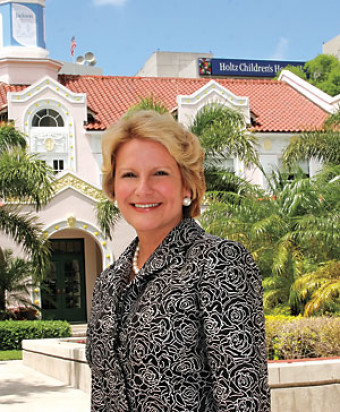SHARE:
Recession, Reform and Charity Care
Q&A with Dr. Eneida Roldan, President of Jackson Health System
On June 1, Dr. Eneida Roldan took over as president and CEO of Miami’s Jackson Health System, the state’s largest public hospital system and one of the country’s largest providers of charity care. Revenue in 2008 totaled more than $1.9 billion. Roldan, who did her residency in clinical pathology and pediatric pathology, is a native of Miami. The first woman and first Hispanic to lead the hospital system, she spoke with Florida Trend about Jackson Health, the impact of the recession and healthcare reform.
 "Certain diseases don’t have to be treated in an in-patient setting. They can be seen in an observation-type unit. ... We maintained our quality care on the emergency side. Doing that, we have really now delivered healthcare how it should be, based on the needs of the patient." [Photo: Scherley Busch] |
Dr. Roldan: Let me expand on those numbers. The $500 million — and I believe it is $538 million that was reported on our audited financials for the fiscal year ending Sept. 30, 2008 — is actual cost. If we look at that in charges, we would be very close to $800 million.
The 15.4% to 19.5% increase was actually in the first quarter of this fiscal year, which was Oct. 1, 2008, to Dec. 31, 2008. Now what we’re seeing is that it has leveled off somewhat, and we believe the reason for that is very much tied to what the national trends are showing. A lot of the uninsured are afraid to go to the emergency room. These are people who in the past have been employed and have lost their insurance. That to us is very scary because when people delay care, they’re putting their health in jeopardy and the cost of delivering more intensive care is at a higher price. So, yes, we did see an increase. Now it has somewhat leveled off. That does not mean that we’re not going to see another jump.
FT: What are you doing in terms of operational efficiencies to meet the challenges?
Dr. Roldan: First and foremost, one of the things that we did starting last year is that we prepared our emergency rooms. As you well know, that is the entry point for patients who don’t have insurance. So we were able to do what I call stratifying the healthcare in the emergency room. We increased our express care, which means that people who didn’t have insurance who may have come in with a broken finger didn’t have to wait long hours because they were not mixed in with emergency care patients.
We opened up an observation unit. Certain diseases don’t have to be treated in an in-patient setting. They can be seen in an observation-type unit, which provides a 23-hour admittance and then they can be discharged. We maintained our quality care on the emergency side. Doing that, we have really now delivered healthcare how it should be, based on the needs of the patient.
We are also working very closely on a disease management project or approach. Patients with chronic diseases such as congestive heart failure, diabetes, hypertension, etc., now don’t have to come back to the emergency room. We do have external clinics that are following their healthcare. Therefore, we have reduced the admissions of these chronic diseases to our emergency room and thus reduced the overcrowding in the emergency room.
FT: What would you like to see come out of healthcare reform?
Dr. Roldan: One of the things that really excites me about healthcare reform is the universal coverage. Obviously, being in an institution such as Jackson Health System, we do see a number of the uninsured.
I am also a proponent of preventive medicine and wellness. I believe we don’t incentivize preventive care. We do incentivize what I call supportive or catastrophic care, and those come at a higher cost.
I like the fact that the quality of care will be enforced with the help of the federally qualified (safety net) health centers, which have built an infrastructure that provides us with more resources. This shifting of dollars will provide even greater quality and greater access to patients.
One of the things that I am committed to accomplishing, together with our academic partners at the University of Miami Leonard M. Miller School of Medicine and Florida International University’s Wertheim College of Medicine, is that in the upcoming months we are going to focus on graduate medical education and try to align it with what will best serve the healthcare delivery.
FT: What will be different about the training of doctors?
Dr. Roldan: If the health reform incentivizes primary care, I think there’s going to be shifting to incentivize the medical schools and the training programs to train more primary care physicians rather than specialists.























